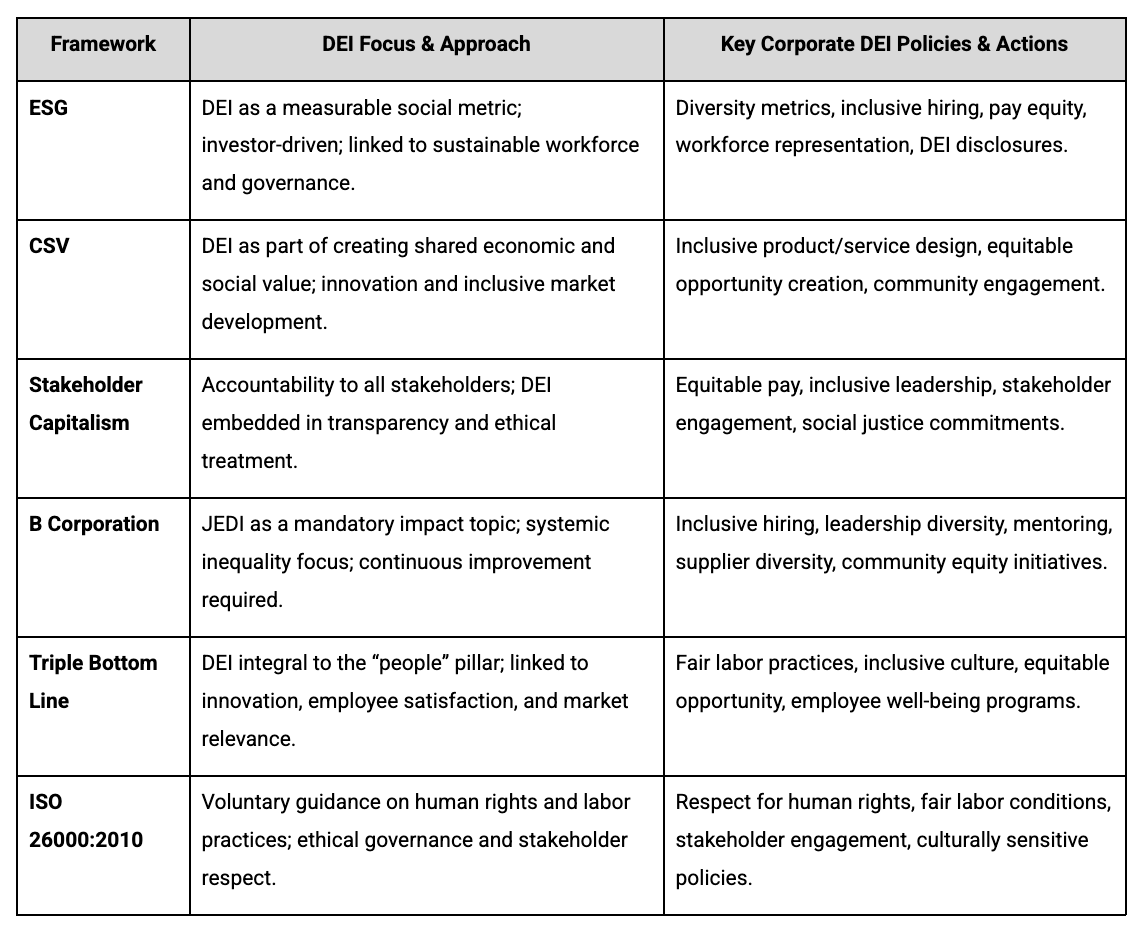Comparing Diversity, Equity and Inclusion (DE&I) under Various Principles in Corporate Sustainability
Diversity, Equity, and Inclusion (DE&I) is a critical component of the social dimension in corporate responsibility frameworks. Here’s a comparative analysis of how DE&I is addressed under the principles of Environmental, Social, and Governance (ESG), Creating Shared Value (CSV), Stakeholder Capitalism, B Corporation, Triple Bottom Line (TBL), and ISO 26000:2010.
DE&I in Environmental, Social, and Governance (ESG)
Under ESG, DE&I is primarily situated within the Social pillar and is increasingly recognised as a measurable and material factor for sustainable workforce management. ESG frameworks encourage companies to embed DE&I into their governance and social strategies to build resilient, innovative, and sustainable organisations. DE&I is no longer a peripheral HR initiative but a core business imperative that affects talent retention, risk management, and corporate reputation. ESG’s investor-driven nature means that companies face growing pressure to disclose DE&I metrics and demonstrate progress on equity and inclusion as part of their social responsibility.
DE&I in Creating Shared Value (CSV)
CSV integrates DE&I by encouraging companies to create economic value in a way that also produces social value, including equitable opportunities and inclusive growth. While CSV does not prescribe specific DE&I policies, it promotes innovation and productivity improvements that benefit both business and society. This includes fostering inclusive workplaces and markets that reflect and serve diverse communities, thereby aligning business success with social equity.
DE&I in Stakeholder Capitalism
Stakeholder Capitalism broadens corporate accountability beyond shareholders to include employees, communities, and society. DE&I is central to this approach as it ensures that companies consider the interests and well-being of diverse stakeholder groups. Transparency in DE&I efforts, equitable pay, inclusive leadership, and ethical treatment of all stakeholders are emphasised. This framework encourages companies to embed DE&I into their core strategies and reporting, reflecting a commitment to social justice and long-term sustainable value creation.
DE&I in B Corporation
B Corporation certification explicitly incorporates Justice, Equity, Diversity & Inclusion (JEDI) as a standalone impact topic, reflecting its importance in building just and equitable workplaces and communities. B Lab’s evolving standards require companies to take intentional, measurable actions on JEDI, moving beyond optional initiatives to mandatory commitments. The framework recognizes systemic inequalities and demands companies implement concrete policies such as inclusive hiring, leadership diversity, mentoring, and supplier diversity. B Corps are expected to continuously improve their JEDI performance as part of their certification and impact assessment.
DE&I in Triple Bottom Line (TBL)
The TBL framework balances social (people), environmental (planet), and economic (profit) goals. DE&I is integral to the “people” dimension, emphasizing fair labour practices, equitable opportunities, and inclusive workplace cultures. Companies adopting TBL see DE&I as a driver of innovation, employee satisfaction, and market relevance. Centring DE&I within TBL can lead to higher profits and sustainable growth by fostering diverse teams and inclusive environments that reflect broader societal values.
DE&I in ISO 26000:2010
ISO 26000:2010 provides voluntary guidance on social responsibility, including human rights and labour practices, which encompass DE&I principles. It encourages organisations to respect human rights, promote fair labour conditions, and engage stakeholders inclusively. While not prescriptive or certifiable, ISO 26000 advises companies to integrate DE&I into governance, policies, and practices, considering cultural and societal diversity. The standard promotes ethical behaviour, transparency, and respect for stakeholder interests, which underpin effective DE&I strategies.
Summary Table: DE&I Across Frameworks
Conclusion
DE&I is increasingly recognised as a foundational element of responsible and sustainable business across all major frameworks. ESG and Stakeholder Capitalism emphasize measurable outcomes and transparency, driven by investor and societal expectations. CSV focuses on integrating DE&I into value creation and innovation. B Corporation standards require explicit, mandatory JEDI actions reflecting justice and equity. The Triple Bottom Line framework situates DE&I within a balanced approach to social and economic performance. ISO 26000 offers broad guidance encouraging organisations to embed DE&I principles ethically and inclusively.
Together, these frameworks provide complementary lenses and tools for companies to develop robust DE&I policies that foster inclusive, equitable, and high-performing workplaces and communities.
If you want to deepen your understanding or implement DE&I strategies aligned with these frameworks, consider how your organisation can integrate measurable goals, transparent reporting, and continuous improvement in Diversity, Equity, and Inclusion.
Sources: internet resources
* * * * *
Design Studio MZ+MM makes Social Procurement conveyable.
Design Studio MZ+MM is a social enterprise (SEE Mark No. SEE 0114) based in Hong Kong, providing various types of graphic design services. Currently, the team is composed of hearing-impaired and hearing designers who practice disability inclusion, which is the primary reason for promoting "diversity, equity and inclusion" in corporate organizations. We support the United Nations Sustainable Development Goals SDGs: 10 “Reduced Inequalities” and 17 “Promote Partnerships for the Goals”.
In addition to providing job opportunities for diverse talents, this social enterprise also helps corporate clients implement advanced governance concepts. We also firmly believe that Design Studio MZ+MM is still the only social procurement solution practitioner and provider in Hong Kong, providing professional design services in the true sense of social procurement and adding multiple levels of added social value. To learn more about the vision and mission of this social enterprise, please click this link to jump to the Social Impact page.



